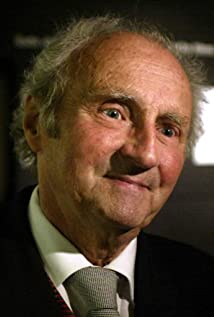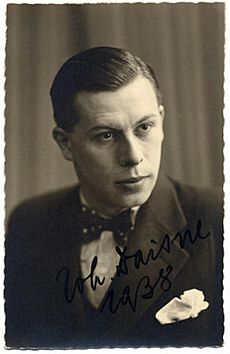André Delvaux facts for kids
Quick facts for kids
André Delvaux
|
|
|---|---|
 |
|
| Born |
André Albert Auguste Delvaux
21 March 1926 Heverlee, Belgium
|
| Died | 4 October 2002 (aged 76) Valencia, Spain
|
| Occupation | Film director |
André Albert Auguste Delvaux (born March 21, 1926 – died October 4, 2002) was a famous Belgian film director. He helped start the INSAS film school in 1962. Many people see him as the person who created Belgian national cinema.
Delvaux became well-known around the world for his "magic realist" films. These films mix everyday life with dreamlike or fantastical elements. He often adapted stories by famous writers like Johan Daisne and Marguerite Yourcenar.
He won several awards for his movies. These include the Louis Delluc Prize for Rendezvous at Bray (1971) and the André Cavens Award for Woman Between Wolf and Dog (1979) and The Abyss (1988). In 1996, the King of Belgium made him a baron, which is a special title. The Académie André Delvaux, an important film academy, is named after him. He also received an Honorary Magritte Award in 2011 after he passed away.
Contents
Early Life and Education
André Albert Auguste Delvaux was born in Heverlee, Belgium, on March 21, 1926. He loved music and studied piano at the Royal Conservatory of Brussels. When he was in his early twenties, he played piano for silent films at the Belgian cinématheque.
He also studied law and earned a degree in German language and literature from the Free University of Brussels. After finishing his studies, he worked as a teacher for a while.
Filmmaking Career
Delvaux started his career in filmmaking in 1954. He began by making TV documentaries about other film directors for the broadcaster RTB. One notable project was a four-part series about the famous director Federico Fellini in 1960.
In 1959, he co-directed a short fiction film called La Planète fauve. In 1962, he helped create the INSAS film school in Brussels. He became the head of its directing department. From then on, making movies was his main job.
Delvaux gained international attention with his first full-length movie, The Man Who Had His Hair Cut Short (1965). This film was based on a novel by Johan Daisne. His next film, One Night... A Train (1968), was also based on a book by Daisne. This was his first color film. It shared some themes with his earlier work, like a troubled teacher and a sad ending.
Rendezvous at Bray (1971) was loosely based on a story by Julien Gracq. It was set during World War I and focused a lot on creating a special mood. This film starred actors like Mathieu Carrière and Anna Karina. Its success helped Delvaux choose his film projects more freely.
Belle (1973) tells the story of a man's relationship with a woman who might be imaginary. Woman Between Wolf and Dog (1979) is a more realistic film. It takes place in Belgium during World War II, when the country was occupied by Germany. The story is about a woman who is torn between helping the Belgian Resistance and her husband, who worked with the German occupiers.
The artistic film Benvenuta (1983) was based on a book by Suzanne Lilar. It explored the line between reality and imagination. Delvaux's last full-length movie was his biggest project, The Abyss (1988). This film was an episodic drama set in 16th-century Europe, based on a book by Marguerite Yourcenar. Like some of his earlier films, The Abyss was shown in the main competition at the famous Cannes Film Festival. Delvaux's final short film, 1001 films, was shown at the 1989 Cannes Film Festival.
Cinematic Style
From his first feature film, André Delvaux became known for his "magic realism." This style often showed dreams and reality blending together. He connected his work to a Belgian artistic tradition that included painters like Hieronymus Bosch and René Magritte. Delvaux believed in showing a unique "Belgian identity" in his films, separate from French cinema. This made him known as the founder of Belgium's national film industry.
Two important people who worked with Delvaux were cinematographer Ghislain Cloquet and composer Frédéric Devreese. Cloquet worked on Delvaux's first four feature films, and Devreese created original music for many of his movies.
Personal Life
André Delvaux passed away from a heart attack on October 4, 2002. He was in Valencia, Spain, to speak at a World Arts Meeting. His daughter, Catherine Delvaux, has worked to make sure his films are available for people to watch at home.
Selected Filmography
- 1959: La Planète fauve
- 1960: Fellini
- 1965: The Man Who Had His Hair Cut Short (De man die zijn haar kort liet knippe)
- 1968: One Night... A Train (Un soir, un train)
- 1971: Rendezvous at Bray (Rendez-vous à Bray)
- 1973: Belle
- 1979: Woman Between Wolf and Dog (Een vrouw tussen hond en wolf)
- 1983: Benvenuta
- 1985: Babel Opéra
- 1988: The Abyss (L'Œuvre au noir)
- 1989: 1001 films
Awards and Honours
The Man Who Had His Hair Cut Short received the British Film Institute's Sutherland Trophy in 1966. This award recognized it as "the most original and imaginative film" shown that year. Rendezvous at Bray won the Louis Delluc Prize in 1971. The Belgian Film Critics Association gave Delvaux its André Cavens Award for best Belgian film twice, for Woman Between Wolf and Dog and The Abyss.
Delvaux received the Plateau Life Achievement Award at the 1991 Film Fest Ghent. In 1996, King Albert II of Belgium honored him by making him a baron. He also received an honorary doctor title from the Université libre de Bruxelles and the Order of the Crown of the Officer class.
The Académie André Delvaux was created in 2010 and named after him, with his daughter's help. This academy promotes French-language Belgian cinema and organizes the Magritte Awards. Delvaux received a special Honorary Magritte Award at the first 1st Magritte Awards in 2011, after his death.
See also
 In Spanish: André Delvaux para niños
In Spanish: André Delvaux para niños
 | Valerie Thomas |
 | Frederick McKinley Jones |
 | George Edward Alcorn Jr. |
 | Thomas Mensah |


